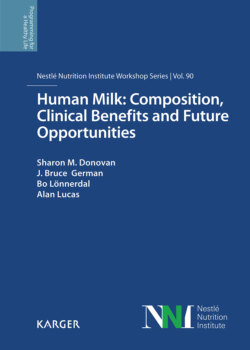Читать книгу Human Milk: Composition, Clinical Benefits and Future Opportunities - Группа авторов - Страница 20
На сайте Литреса книга снята с продажи.
Necrotizing Enterocolitis and Systemic Sepsis
ОглавлениеIn term infants, breastfeeding is associated epidemiologically with significant reduction in infection. In preterm infants, more serious infective/inflammatory conditions – notably NEC and proven systemic sepsis – are common, and RCTs and related studies can be used to test the impact of HM versus CM as a model. At least 7 RCTs including trials from the prefortifier era [18] and 2 trials of lacto-engineered products examined the impact on NEC [21, 22]. In all, 6 trials of HM/CM exposure were included in a Cochrane meta-analysis [18]. Collectively, the RCTs show around a 3-fold increased risk of NEC with CM exposure. Further to this, at least 8 quasi-experimental studies have been done on around 4,000 (published in full [23] or in abstract form) that examine the impact of introducing an EHM diet with lacto-engineered products; the incidence of NEC was on average 3 times higher when infants were exposed to CM compared to those fed the EHM diet. With regard to sepsis, 3 historic RCTs from India showed exposure to CM increased the risk of major infection [24]; and the quasi-experimental study on 1,600 babies before and after introducing an EHM diet using lacto-engineered products showed a major fall in the incidence of late-onset sepsis from 30 to 19% [23]. We conducted 2 further RCTs with NEC or sepsis as a combined outcome – our fortifier trial [19] and an unpublished analysis of our historic trial comparing preterm formula with DBM; in both cases, NEC or sepsis was doubled in the CM limb. The US trials on lacto-engineered products showed NEC, NEC surgery, and sepsis were dose related to the amount of CM in the neonatal diet [25], in accord with our own data from the UK [26].
Thus, at least 12 RCTs and 8 quasi-experimental studies show that HM has a major protective effect against infective/inflammatory conditions that provide support for a causal role of breastfeeding in protecting against infection in term infants.
The clinical importance of NEC and sepsis is emphasized by the evidence that these are accompanied by an increased risk of cerebral palsy and lower cognitive performance [27].
